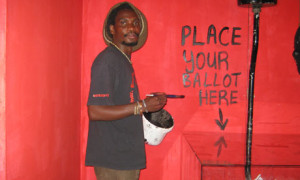freeDimensional
Constitutional Court Admonishes Prosecutors Over Abuse Of Insult Laws As Visual Artist Maseko Wins In Court
Posted on November 1, 2013 | No Comments
 Press Release: 30 October 2013
Press Release: 30 October 2013
Zimbabwe Lawyers for Human Rights (ZLHR) is encouraged by the decisions passed on Wednesday 30 October 2013 by the Constitutional Court in two constitutional matters brought before it challenging the constitutionality of some offensive provisions of the Criminal Law (Codification and Reform) Act.
In the case of Mr Tendai Danga, the Constitutional Court struck off the matter from the court roll after the National Prosecuting Authority (NPA) withdrew the charges preferred against the Bulawayo resident. Tendai Danga faced charges of undermining authority of or insulting President Robert Mugabe in contravention of Section 33 (2) (a) (ii) of the Criminal Law (Codification and Reform) Act (Chapter 9:23) in a matter that commenced more than two years ago.
The State, represented by Mr Uladi from the NPA was quick to concede that the facts in the original matter did not disclose the offense of insulting the President.
This prompted Deputy Chief Justice Luke Malaba to issue a stern warning to the NPA to review similar cases and to ensure that only deserving cases were brought to the Constitutional Court. He admonished the NPA against prosecuting matters in which statements were uttered in drinking halls and other social places, as the pursuit of such frivolous matters only served to bring disrespect on the Office of the President.
This comes in the wake of close to 80 similar cases which are currently pending before the Constitutional Court and other subsidiary courts of the land. Since 2010, there has been a dramatic increase in the arbitrary application of Section 33 of the Criminal Law (Codification and Reform) Act (Chapter 9:23), where individuals have been charged with allegedly “insulting or undermining the authority of the President”.
Prosecutors had claimed that Danga, who was represented by Zimbabwe Lawyers for Human Rights, had questioned the integrity of the Zanu PF leader as President of the Republic of Zimbabwe.
In the other matter, the Constitutional Court on Wednesday 30 October 2013 declared as unconstitutional Sections 31 (a) (iii) and 33 (a) (ii) of the Criminal Law (Codification and Reform) Act (Chapter 9:23) as they were in contravention of Sections 20 (1), 19 (1) and 18 (1) of the former Constitution of Zimbabwe.
In a unanimous decision in the matter of Owen Maseko v the Attorney General, SC60/11, the Constitutional Court granted a consent order stating that the State represented by Mr Chris Mutangadura of the NPA had not shown that Sections 31 (a) (iii) and 33 (a) (ii) of the Criminal Law (Codification and Reform) Act (Chapter 9:23) are not in contravention of Sections 20 (1), 19 (1) and 18 (1) of the former constitution.
In an order handed down by DCJ Malaba, the highest court asked Justice, Legal and Parliamentary Affairs Minister Emmerson Mnangagwa to appear before the highest court on 20 November 2013 to show cause why Sections 31 (a) (iii) and 33 (a) (ii) of the Criminal Law (Codification and Reform) Act (Chapter 9:23) should not be declared to be in contravention of Sections 20 (1), 19 (1) and 18 (1) of the former Constitution of Zimbabwe.
Maseko, who was also represented by ZLHR, petitioned the Constitutional Court seeking an order to declare as unconstitutional laws infringing on artists’ rights to free expression and freedom of conscience, particularly freedom of thought as guaranteed in the Constitution. The visual artist was arrested in March 2010 and charged with contravening Sections 31 (a) (iii) and 33 (a) (ii) of the Criminal Law (Codification and Reform) Act (Chapter 9:23) for staging an exhibition in Bulawayo depicting the 1980s Matabeleland massacres known as Gukurahundi carried out by a crack military unit on the instructions of the government. Maseko was accused of undermining the authority of or insulting the President and causing offence to persons of a particular race or religion. His exhibition, which showcases paintings that explored the torture and massacres that characterized the civil unrest known as Gukurahundi, was forcibly shut down.
For more information visit: www.zlhr.org.zw
Image reposted from TheGuardian.com
Tags: owen maseko > Robert Mugabe > Zimbabwe > Zimbabwe Lawyers for Human Rights
Comments
Leave a Reply









